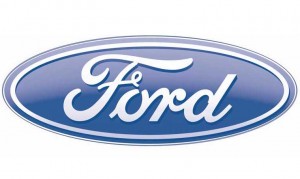
Shouldn't that be the Ford "Red Oval" these days?
Ford Motor Co. lost $5.9 billion, or $2.46 per share in the fourth quarter of 2007 as the company was swamped by losses in key markets around the world including Europe and Asia and revenue dropped 36 percent.
Ford is the only one of the Detroit Big Three not to have sought federal assistance, last month. Alan Mulally, Ford’s chief executive officer, stressed that despite the automaker’s dismal numbers, it has not intention to ask the federal government for a bailout – with one exception. “The bankruptcy of a major competitor” that disrupted suppliers might require the company to seek a bailout, he said.
Ford, however, does expect to tap funds from a separate fund set up by the Department of Energy to promote the development of high-mileage vehicles, and from the European Union to help pay for development of more efficient products. And the automaker does plan to use the company’s $10 billion line of bank credit, said Mulally, who noted Ford now expects sales around the world to drop by a record 10 percent this year.
“Business conditions have deteriorated around the world more rapidly than expected,” Mulally said.
Ford is moving aggressively to contain its costs. The United Auto Workers union has agreed to end the “jobs bank” at Ford, and the company’s credit arm plans to eliminate 1,200 jobs, Ford officials noted. “This clearly is a restructuring of the automobile industry,” Mulally said. “The government wants to see a viable industry in the United States. We’re talking to all the stake holders. I’m very pleased with the response,” he said.
In his conversation with the media, the former Boeing executive stressed that the downturn in the U.S. automotive market is only part of the problem. “Ford and the entire auto industry faced an extraordinary slowdown in all major global markets in the fourth quarter that clearly had an impact on our results,” Mulally said.
“We continued to take the decisive actions necessary to lower production to match the lower worldwide demand and reduce costs, which we expect will allow us to significantly reduce negative operating cash flow in 2009 and position Ford for growth when the economy rebounds,” Mulally said.
If there was any positive side to the current downturn, Mulally noted, it’s a modest reversal of Ford’s long slide in share. “Our market share growth in the fourth quarter in the U.S. and Europe is a positive sign that customers recognize the value of our new products and understand that a new and different Ford is emerging,” Mullaly said.
Ford’s fourth quarter pre-tax operating loss from continuing operations, excluding special items, was $3.7 billion, a decline from a loss of $620 million a year ago. On an after-tax basis, Ford lost $3.3 billion in the fourth quarter or $1.37 per share, compared with a loss of $487 million, or 23 cents per share, a year ago.
Ford said it had $13.4 billion cash on hand as of Dec. 31 and plans to exercise a $10.1 billion secured credit line Tuesday. Chief Financial Officer Lewis Booth said the company is tapping the credit line only to make sure it’s available and not to fund its operations.
Ford’s cash burn rate slowed for the fourth quarter from $7.7 billion in the third quarter.
For the full-year, Ford reported a full-year net loss of $14.6 billion, compared with a loss of $2.7 billion in 2007.
Booth said Ford still is on track to break even in 2011, but the company anticipates worldwide sales to fall more than 10 percent in 2009. Ford sees improvement later this year, however, as government stimulus packages take effect.

I have filed lose for the automobile industry if I can make contact with someone in your organization by telephone or e-mail please stop hiding this is important that will save the automobile industry of America please call me at 847-466-2221
tell us more, please, Herb.